What is science?
Science can be defined as a way in which we view our world based on observation, testing and application. According to the Science Council, Science is the “pursuit and application of knowledge and understanding of the natural and social world following a systematic methodology based on evidence.”
Why would anyone want a career in science?
Science allows your child to make worthwhile, long-lasting contributions to the world. It is more than just an academic subject. Science does require research and study; however, it demands creativity, imagination and problem-solving. It therefore allows your child to utilise many skills that they may enjoy playing with.
A career in science is also varied and diverse. A career in science can take on many forms. Here are just a handful of fields open to your child if they study science and STEM subjects (Science, Technology, Engineering and Maths):
- Product and process development in the manufacturing and production industry. These scientists assist research teams in manufacturing high-end, quality and safe products, which range from foodstuff to cosmetics;
- Marketing and sales. These scientists use their knowledge to sell medical supplies, drugs and chemicals. They also help to sell scientific services;
- Management consultancy. These scientists use their research and analytical skills to solve client pain points;
- Working with governments to create public policies relating to medicine and climate change;
- Developing innovative ideas to solve global issues, such as alternative energy sources;
- Researching medicines, such as cures for cancer and developing vaccines;
- Solving societal issues such as world hunger and global poverty.
The above are only a few of the career paths that studying science can lead to.
Visit the Prospects website below to discover more exciting career paths for a scientist:
Why is it important for us to encourage our children to pursue science?
According to findings from STEM Learning, there is a STEM skills shortage in the UK, which is costing £1.5 billion a year, as STEM businesses must take on temporary staff, invest in training and inflate salaries to attract people. What is worse, there is a lack of diversity in those studying STEM subjects, and so going on to take up STEM occupations. There are fewer women, fewer people from lower-income backgrounds, and fewer people from BAME communities in STEM careers. Therefore, STEM research and STEM businesses are missing out on crucial input from talented individuals, who could offer these fields so much.
With the above in mind, it’s vital that parents, guardians, teachers and tutors encourage their children/students to pursue a career in science because many children, who might otherwise enjoy it, are being denied the exposure to STEM subjects in a way that is conducive for them to want to take it up as a fielf of study, and career.
How to encourage our kids at home?
You yourself may not have had a positive experience of science as a child. You may have found it dull and difficult, but that does not mean that you do not have what it takes to inspire your child in the sciences.
You might be thinking, “Well, it might be true that I can inspire my kids to take up sciences, but surely there are more impactful ways of doing it?”
Nothing could be further from the truth! Research has shown that individuals, who took up sciences, were encouraged by their family members either directly or indirectly.
The following table from Pew Research Centre, lists some of the main motivators for individuals pursuing science:
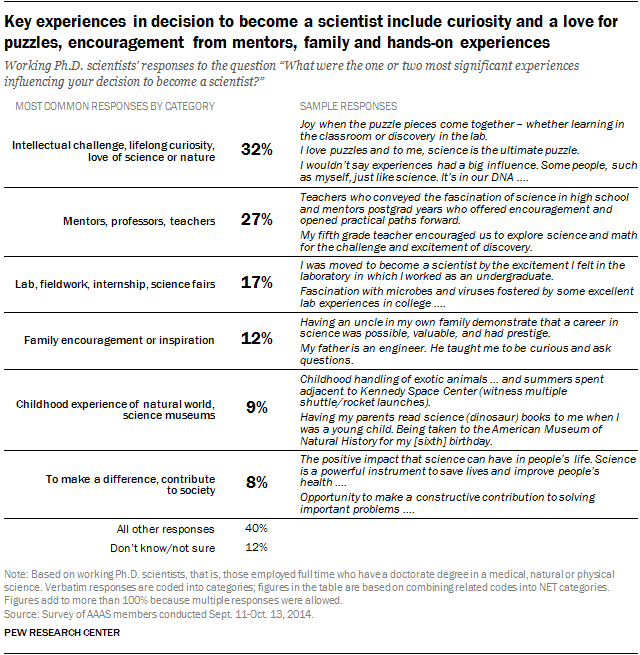
Therefore, do not under-estimate your role in fostering a love of science in your child. We can nurture our child’s curiosity and love of nature; we can take our children/students to science fairs and do fieldwork, and we can encourage them through positive reinforcement.
Perhaps a more powerful way to express this point is an anecdote that I heard a few years ago. A famous researcher was being interviewed about why he took up science as a career. The researcher said:
When I was a child, I tried to remove the milk bottle from the fridge. I lost grip of it and dropped it, spilling milk everywhere. When my mother entered the kitchen, she did not scold me or lecture me in what I should have done. Instead she said:

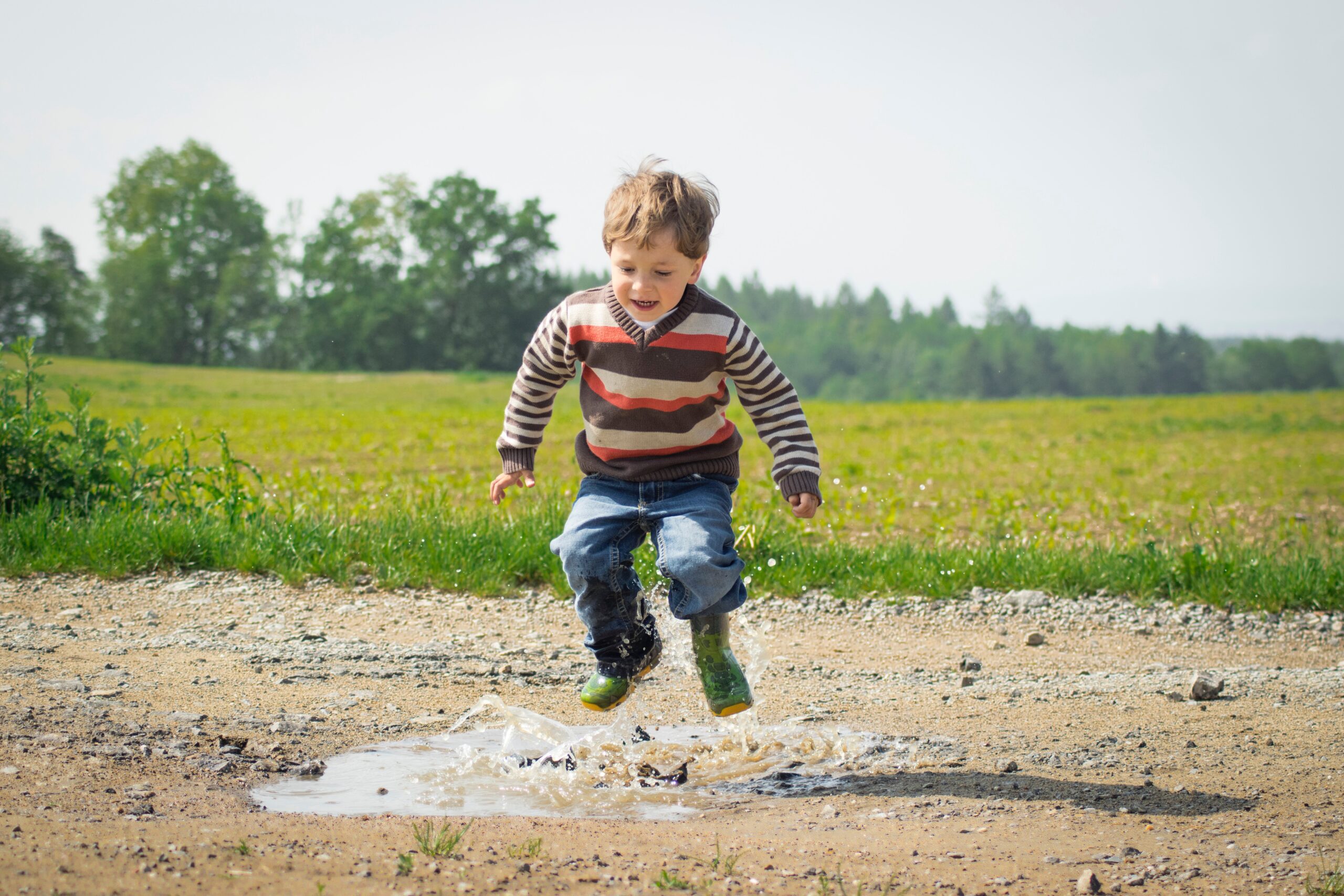
“Robert, what a great and wonderful mess you’ve made! I have rarely seen such a huge puddle of milk. Well, the damage has been done. Would you like to spend a few moments playing in the milk before cleaning it up?”
I then played in it for a while. Afterwards, my mother said, “You know, Robert, whenever you make a mess like this, eventually you have to clean it up and restore everything to its proper order. So, how would you like to do that? We could use a sponge, a towel, or a mop. Which do you prefer?”
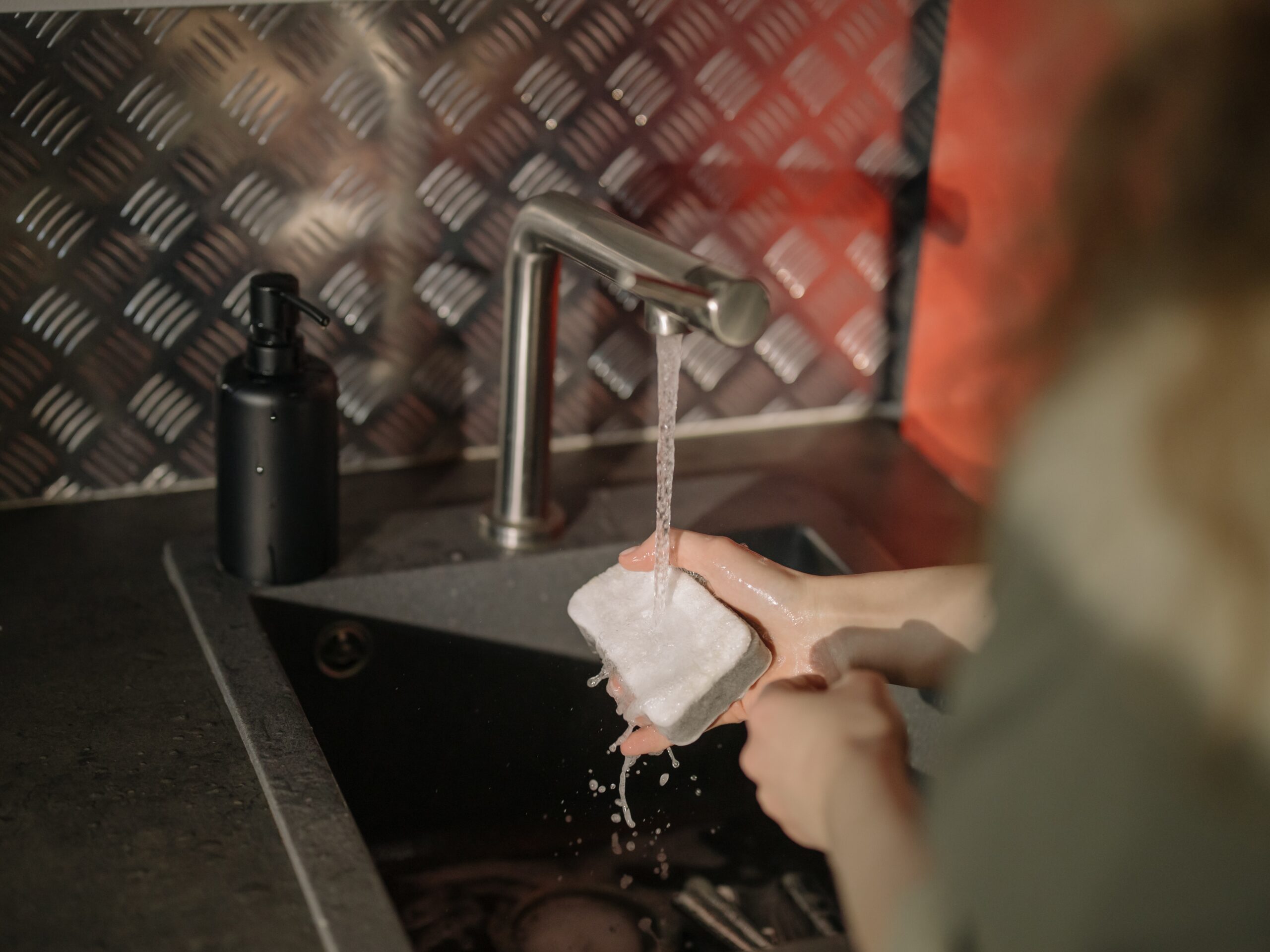
I chose the sponge, so together we cleaned it up.
My mother then stated, “You know, what we have here is a failed experiment in how to effectively carry a big milk bottle with two tiny hands. Let’s go out in the back yard and fill the bottle with water and see if you can discover a way of carrying it without dropping it.”
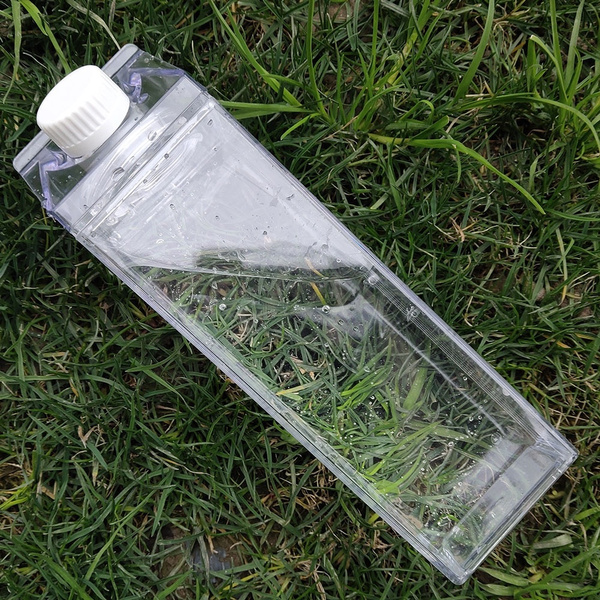
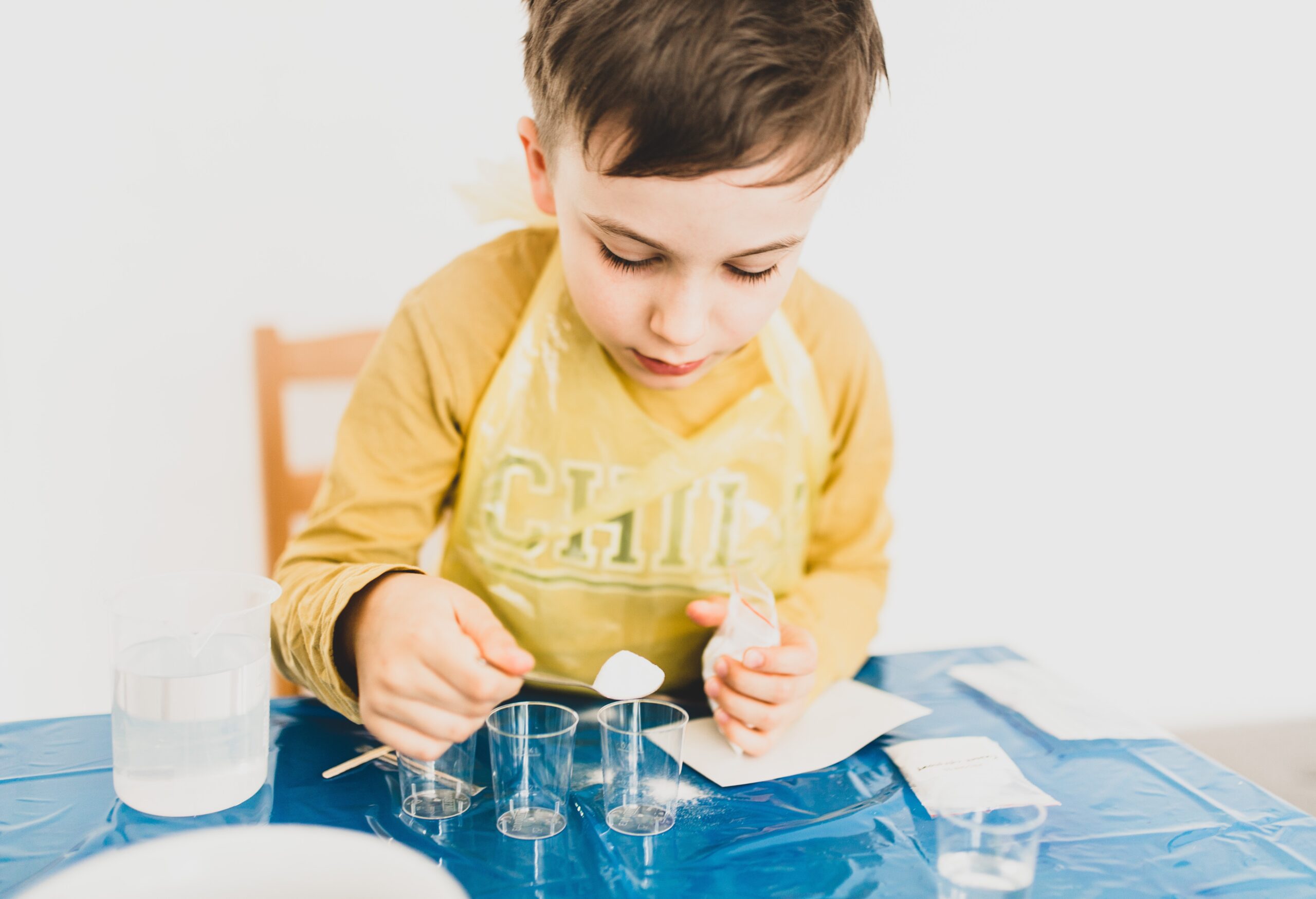
I then discovered a way to lift, hold and carry the bottle without dropping it. From then onwards, I was never afraid of making a mistake.
What this anecdote illustrates, that we can inspire our children to take up sciences by the way we are with our children, and by the language we use when communicating with them.
So, what can you do to inspire a love of science in your child?
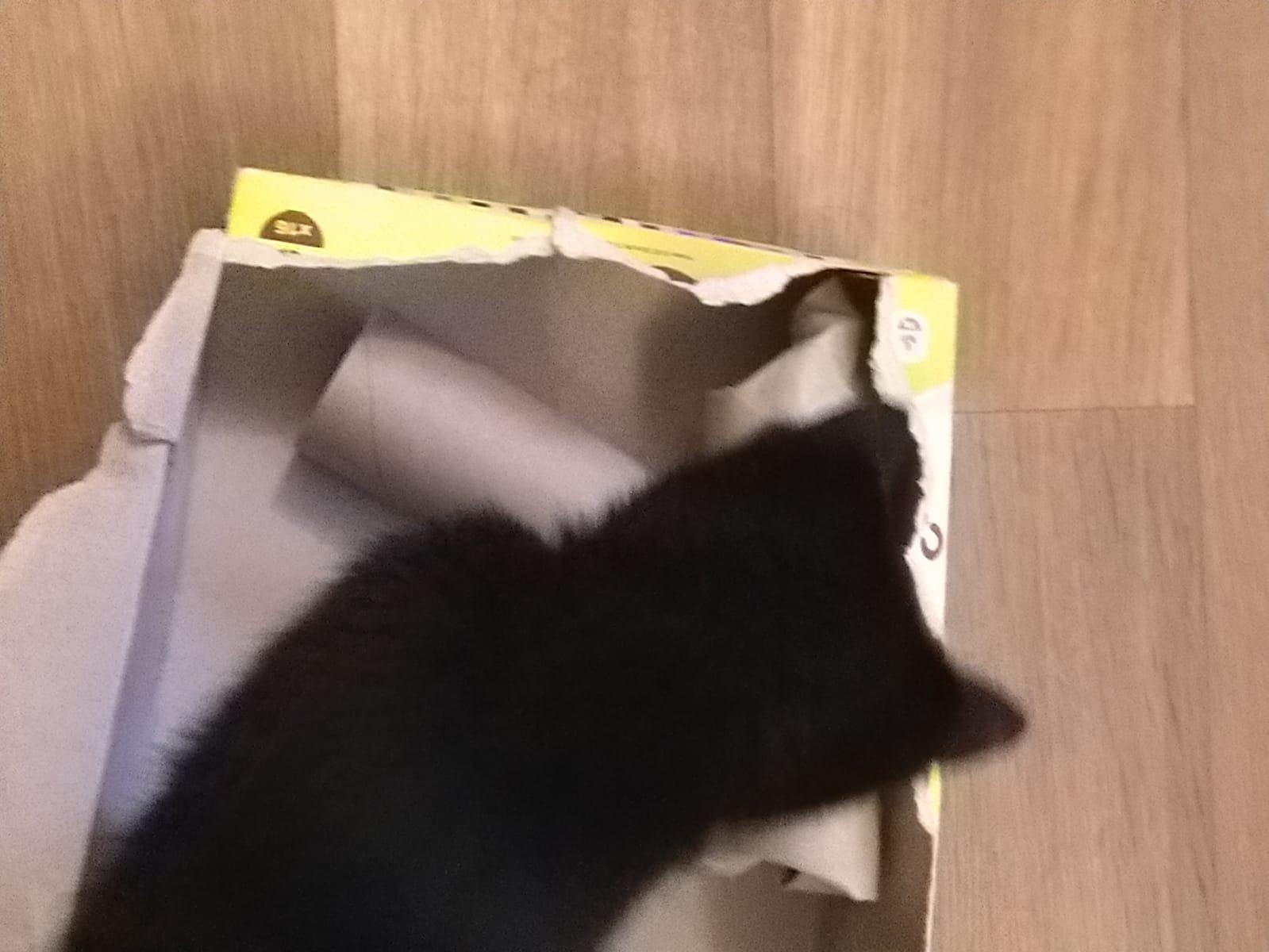


Collect cardboard boxes
Old cardboard boxes are a playground of fun for your child! You could ask your child to use loo roll tubes and cereal boxes to make mazes. The above is an example of a home-made maze that I was in the middle of making when the kitten decided he couldn’t wait for the final product 🙂
There are links in the ‘References’ with more maze ideas for you and your child to try out at home.
Observe flora
When you’re outside going for a walk, ask your child to take note of the different flora. Ask them, for example, to look at the differences/similarities between the leaves and blades of grass. Encourage them to write down their observations. Inspire them to postulate on why they are similar/different. They could also keep a ‘flora journal’ and draw pictures of what they see and recording their observations.
Ask them to make lunch!
Ask your child to prepare lunch for a few days in a week. For instance, get them to butter two slices of bread. Perhaps they could use a plastic knife to spread the butter. They can note how easy it was for them to do. The next day, ask them to use a metal knife. Get them to write down how they found spreading the butter. The following day, ask them to use the back end of a spoon. Ask them how that compared to the other two forms of cutlery.
All of this might seem trivial, but what you are doing is nurturing an inquisitive mindset in your child. You are also making them their agent in their life, so that they are willing to experiment, to test their ideas without feeling like a failure.
Overall
Parents, guardians, teachers and tutors all have a significant influence on whether their children/students are inspired by sciences. To help foster a love and passion for the field, remember:
- Use words of encouragement. Rather than be quick to scold them when a mistake occurs, ask them what they could differently and how they plan to ‘clean up their mess’;
- Expose them to scientific works. Go online and see what experiments and field work you can find to help bring the sciences to life;
- Experiment safely at home. If you do not have a chemistry set; or, a telescope, you can still conducts experiments at home utilising household items;
- When you go for a walk or to the shops ask your child to observe their surroundings and to postulate reasons for what they see.
So, despite our own personal experiences, a career in science can be exciting, fulfilling and rewarding, as your child can work independently; or, as part of a team to bring about real world changes for their communities, societies and for the world. And remember, even if your child decides not to pursue a career in science, they can still use the skills they have honed to come up with imaginative solutions to problems; they can analyses and deduce based on evidence, rather than accepting what they hear or read at face value.
References
https://luminate.prospects.ac.uk/the-uks-stem-skills-shortage
For more cardboard box ideas:
https://www.pinterest.co.uk/pin/480407485221871126/visual-search/?x=10&y=10&w=220&h=285&cropSource=6
http://monkeydoit.com/
